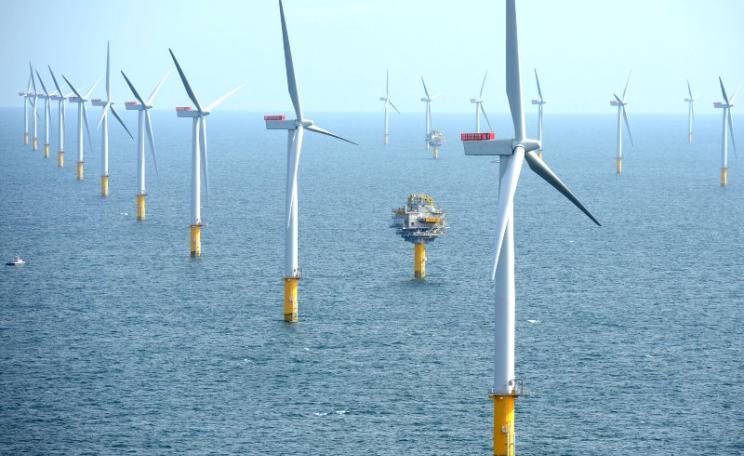Based on the US experience, we face the prospect of pollution of our aquifers, air pollution from the leakage of methane and benzene from 5% of the thousands of wells, the problem of contaminated sludge disposal, heavy lorry traffic, and earthquakes.
There are distinct similarities between the 1848-1855 gold rush and the recent US frenzied rush to tear apart its shallow shale beds regardless of cost to people and the environment.
Greed drives the free world to the strangest activities which are then justified by the buying of scientific 'objective' evidence in support of its folly.
Both 'rushes' were short lived and mining communities sprang up only to disappear again with the low oil price being the culprit in the case of shale fracking around 2014.
True, the US shale industry is fighting a rallying rearguard action to restart large scale production. Unfortunately the US-led shale revolution and its resultant production turf war with OPEC (basically Saudi Arabia), which drove down oil prices, has been the single biggest reason for the loss of 120,000 North Sea oil-related jobs.
An alternative and credible explanation for the sustained drop in prices is that the US decided it could live with low oil prices in the short-to-medium term and cooperated with its ally Saudi Arabia to reduce oil prices and thereby attempt to bring oil dependent Russia, Iran and Venezuela to their economic knees for geopolitical reasons. In both scenarios US action has led to UK North Sea job losses.
Incredibly, Westminster has been so transfixed by the overhyped so-called special relationship between the UK and the US that rather than saying "wait a minute you guys, what the hell are you doing?", they beg for a piece of the shale action.
It seems that the UK government is happy to abandon the North Sea to focus their full attention on fracking apart the onshore shale beds of England, Wales and Scotland.
US experience tell us: 5% of wells will leak toxic pollution
Being shallow in depth, fracking involves drilling mile after mile horizontally into the shale and carrying out explosions on the way, then injecting a water driven toxic mixture of sand and chemicals to keep open the pores of the shattered shale beds that have taken nature millions of years to put in place.
Based on the US experience, we face the prospect of pollution of our aquifers, air pollution from the leakage of methane and benzene from probably 5% of the thousands of wells, the problem of contaminated sludge disposal, thousands of journeys by heavy lorries, and earthquakes. This is as unedifying as setting up home on Scotland's Gruinard Island shortly after it was contaminated by biological warfare testing by the British military in 1942.
Little wonder that, from Lancashire in England to Glasgow in Scotland, communities are fiercely disputing the wild claims and railroading tactics of the Tories and shale industry, that fracking will ensure security of gas supply and further be good for the economy and environment.
Based on the US experience, we face the prospect of pollution of our aquifers, air pollution from the leakage of methane and benzene from 5% of the thousands of wells, the problem of contaminated sludge disposal, heavy lorry traffic, and earthquakes.
Does anyone really believe that all will be well and any public health risks can be effectively regulated away in such a politically charged business vortex?
To believe that onshore gas will keep the lights on, and our homes warm for decades ahead, is surely living in a dream world. Significant doubts remain over how much of this resource can actually be economically extracted and the US shale fiasco indicates any UK venture would be a short lived and toxic affair.
The financial viability of any reserves found are very much dependent on current and future oil and gas prices. In addition, UK shale gas extraction will be more expensive than that produced in the US and there is a real danger that the industry will require such high levels of public subsidy that it will end up costing taxpayers and consumers dearly.
The likely short-term nature of extractable reserves and the financial viability of them has led all credible energy experts to conclude that UK onshore fracked gas will not lower electricity and heating bills!
Bringing home the bacon?
Sustained lower international oil and gas prices are working against the economics of the UK shale industry. For a start, significant levels of private finance will be required to build new pipelines and storage facilities, and to buy kit including fracking rigs, haulage and other specialist equipment.
But with the ongoing financial problems experienced by the US shale and conventional oil industries resulting in the near catastrophic write down in the value of their reserves, it is likely that neither the UK nor the international banking sector would be willing to provide affordable finance to get the industry started in any big way.
A further problem in the UK is that no skilled supply chain exists, and it will require significant diversification by a range of sectors including: production; engineering; haulage; storage; and, facilities management. This supply chain can be developed but it will take time and add to the operating costs of the industry.
Significant sums of public money will also need to be invested. New and improved road infrastructure will be required to avoid congestion and accommodate thousands of lorry journeys. Hundreds of journeys are required to transfer the millions of gallons of water required to frack just one pad, and then to remove the byproduct of highly toxic sludge. As existing treatment facilities will not be able to cope, significant amounts of public money will be required to build new ones.
Even if the private and public finance does become available high capital and operating expenditure will reduce the amount of tax take for the Treasury. If any profits are eventually generated they may well be channeled offshore to overseas investors, who are likely to have provided the upfront finance.
There may be some short-term job creation and the use of skilled people from the offshore oil industry, that could boast Pay as You Earn (PAYE) tax take, but these jobs will be subject to volatile gas and oil prices, and are likely to be short lived. In the current downturn in the North Sea, tens of thousands of jobs have already been lost, with many more losses expected in the next two years. Any future onshore industry will not be immune from such employment shocks.
Finally, it is also likely that the industry would favor American frackers, and we could see a flood of unemployed shale workers come to the UK, with little net benefit to employment here.
A fossil-fools future
Even if onshore gas extraction can eventually prove to be economically feasible, the benefits accrued by the Treasury and the few people who will share the spoils, must be balanced against the need to protect the climate and public health.
One major concern here is that opening up new fossil fuel reserves is incompatible with the need to cut global carbon emissions. Burning new fossil fuels will merely lock us in to a fossil-fools future. It will certainly derail our low carbon transition.
Even with a world leading environmental protection agency, the US has seen significant regulatory and permitting failings and damaging environmental and public health impacts. These violations have resulted in significant environmental, safety and public health concerns. If one looks to the State of Pennsylvania for example, it provides a clear case of the very destructive effects of onshore shale gas extraction.
There is every likelihood that UK fracking would adversely affect other key industries such as tourism, food and drink. These sensory delightful and desirable sectors are highly dependent on Britain's reputation for having a beautiful natural environment free of harmful water, land and air pollution.
For UK Plc fracking will undoubtedly damage the aforementioned sectors and the brands that they have cultivated over generations. For example, would Chinese and Japanese consumers be so keen to buy high quality Welsh lamb, or Scots malt whisky distilled in a fracking contaminated UK - whether or not the distillery was near a fracking play? Would our massive tourist industry be fatally damaged?
We're all right Jack! (But are we?)
In the UK we are told that all will be 'OK' and that we have learnt from the US experience and can formulate appropriate regulatory oversight.
But if one takes time to reflect on UK environmental and health protection over the past 200 years, it soon becomes clear that it can take years, decades, and sometimes generations, for appropriate safeguards to be formulated and put in place.
The activities of the fracking industry are no different and it is delusory to think otherwise. Yet Westminster, perhaps contaminated with too close ties to the fracking fraternity, seems hell bent on forcing fracking on its disbelieving countryside communities.
For a whole raft of cogently argued reasons, Scotland and Wales have boldly imposed moratoriums on fracking. The world is wonderiing if they have the backbone to continue its principled and indeed economically sound stance, and looking to communities across England to maintain their resistance.
Will Britain's resistance to a Donald Trump and Theresa May-inspired view of the (fracking) world continue? We certainly hope so. To do otherwise will surely be a cause for deep regret.
Professor Alex Russell is Chair of the Oil Industry Finance Association.
Peter Strachan (follow me on Twitter @ProfStrachan) is Professor of Energy Policy, Robert Gordon University.
This article is an edited version of one originally published on Newsnet.scot and is republished here by kind permission of the authors, who retain copyright. The opinions and views expressed in this article are those of the authors and not necessarily those of the Robert Gordon University or Affiliates.






